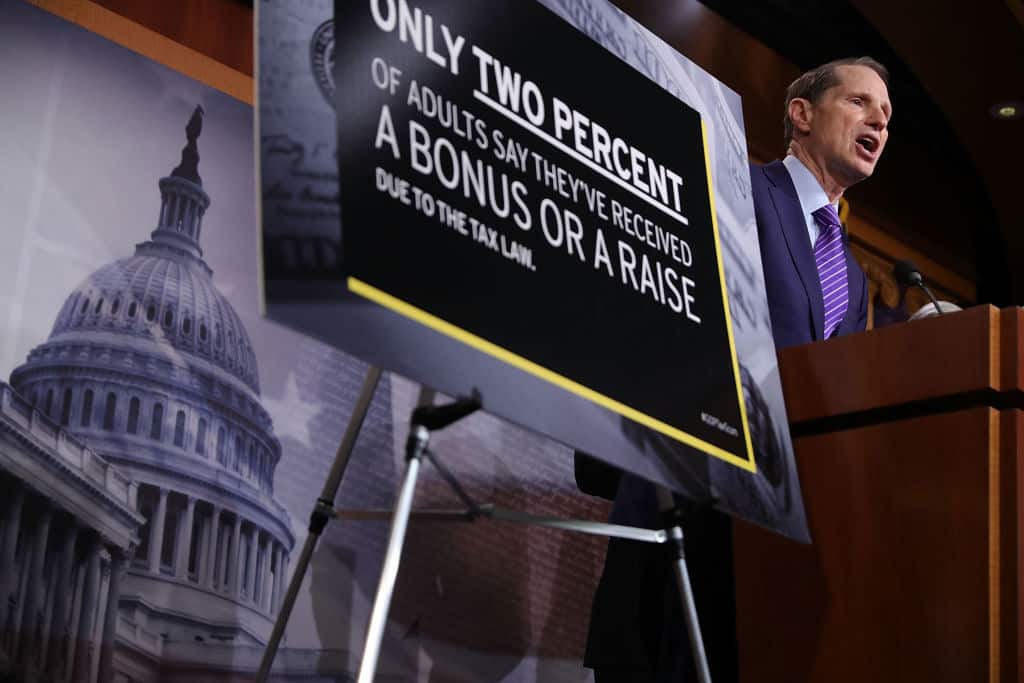By Joe Duffus
Congressional Democrats, hard-up for money to pay for their spending plans, think a “wealth tax” is the way to go. They are exploring a proposal drafted by Oregon progressive Sen. Ron Wyden to tax unrealized capital gains as a way to help pay for new spending. The proposal would be significantly more progressive than other changes to tax rates on corporate and individual taxes, in that it would raise its money from the very, very rich—likely fewer than 1,000 taxpayers—instead of the merely rich, without those assets being converted into income.
This idea is untested in the US, and rests on the observation that very rich people often hold large amounts of wealth as stock in the companies that made them rich. They hold these stock assets in their investment portfolios but under traditional tax law pay taxes only when they sell them.
House Speaker Nancy Pelosi said a tax on billionaires’ assets would likely generate somewhere between $200 billion and $250 billion in revenue over ten years.
The idea of the plan proposed by Wyden, Sen. Elizabeth Warren, and other progressive Democrats seems to be that the government has a right to take part of those assets from someone even when they are not “liquidated” into money that can be called income. An NPR article describes a wealth tax as an annual tax on the net wealth a person holds —assets minus debts – not just the income they bring in each year. Elizabeth Warren compares it to the property taxes people pay on their homes, but just applied to all their wealth above a certain level. The Wyden proposal says this would be imposed only on taxpayers with a net worth in the billions, which he says would limit the tax to about 1,000 taxpayers.
But is this fair?
The super-rich finance their lifestyles by selling a very small amount of their own stock holdings, while the rest keeps growing. They pay capital gains taxes on those withdrawals. But like any business creator, they hold large shares of their company both to invest in themselves and to show the market their confidence in their business’s future. Company founders who suddenly sell large amounts of their own stock make other investors nervous.
But anyone who owns shares in Facebook, Amazon, Google, Microsoft, SpaceX, Tesla and other such companies would be affected, too. Imposing a wealth tax on these ultra-high-income taxpayers would force them to sell more of their assets in order to pay the wealth tax. And what happens to the price of a stock when more shares of it are offered for sale on the market? Its value drops. It is not only the super-rich who have money “on paper;” but everyone with a 401(k) or IRA that is invested in the stock market.
Returning to the “property tax” comparison, it is true that local governments have long financed themselves through real estate assessments on property owners, based on approximate market values for a home if it were sold. This form of taxation does not, however, reflect the debt on the property and is assessed at very low percentages. Moreover, because property taxes have been around for so long, buyers “price in” the annual property taxes they will pay in order to live in certain communities as a factor in their buying decisions. It is a “known.” Conversely, the economic effects on the stock market, the health of Americans’ retirement savings, and on how very successful people make decisions about their own finances if they are suddenly faced with paying a “wealth tax” are not clear.
Billionaire investor Leon Cooperman has been vocally opposed to Warren’s tax proposal.
“What is wrong with billionaires? You can become a billionaire by developing products and services that people will pay for,” Cooperman told Politico. “I believe in a progressive income tax and the rich paying more.” But he added that this is an attack on “the American dream.”

